


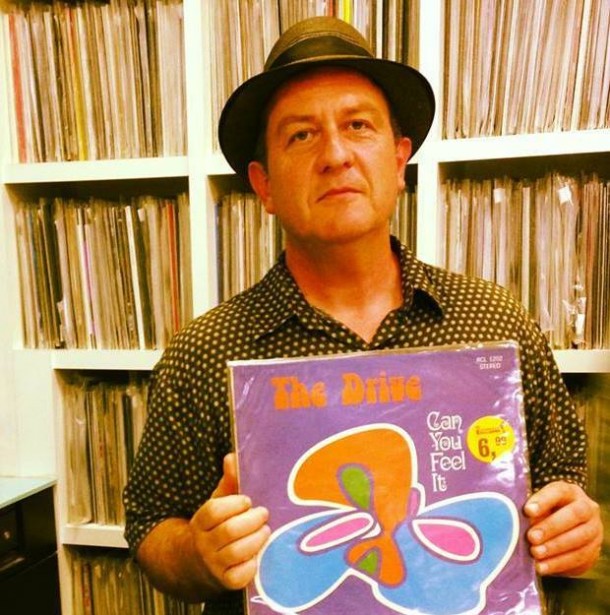
Matt Temple is a living encyclopedia when it comes to South African Grooves. From Jive, Disco or the incredible local Jazz scene, the Matsuli Blog (with Matt Temple in London, and Chris Albertyn in South Africa) has been over the years a priceless source of information for anybody interested in the subject. The quality of its releases has been one of the most consistent of recent years from the Jazzy Disco sound of Dick Khoza to the incredible Spiritual Jazz sound of Batsumi or Sathima Bea Benjamin. Here’s the story behind this phenomenal record archiving experience.
When did you start digging records?
I started buying records in the mid-seventies when I was a teenager but this wasn’t really digging. I would be saving up money and buying albums I read about or friends recommended.
What LPs did you buy at first? Do you still listen to them?
The first LPs I got were albums by the Beatles, Rolling Stones, Led Zeppelin. Pretty soon I moved to punk, post-punk, ska and reggae LPs by the Clash, Specials, Joy Division, Bob Marley and others. I’ve probably heard these LPs too much but I do still listen to them from time to time.
Do you have a particular style or favorite period?
I listen to a lot of music from many different periods and genres. But when it comes to collecting I particularly like Congolese rumba from the 1960s, East African musiki wa dans from the seventies, West African latin and manding sounds as well as lots of tropical styles from cumbia, salsa through to reggae and funk. The period 1960-1980 is key.
Are you still digging’, buying vinyl, visiting record shops?
I visit second hand stores in London regularly but the internet has normalized pricing so chance findings are rare. I love visiting new record stores, especially when travelling, mostly believing that I might find something of interest. I was recently in Cartagena and picked up a great stack of cumbia and salsa originals.
What was your first release on Matsuli?
This was Dick Kloza’s Chapita LP in June 2010.
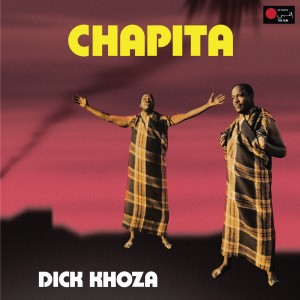
Why did you choose this name: Matsuli?
It was based on the South African Motella label design and is a combination of people’s names.
What could be your editorial/aesthetic line?
Music archaeologists bringing lost musical recordings back to life. And we focus on bringing back original albums, rather than compilations.
How to describe your work? Memory? historian? journalist? witness?
We are on the one hand archivists bringing back to the public important musical works that have been lost, and on the other hand curators as we selecting specific recordings that will be commercially viable.
Do you think Batsumi, the mythical combo of Soweto (you released their two recordings of the mid-1970s), is one of the best musical synthesis between local rhythmic and harmonic jazz? How this soundtrack combines spirituality, with the writings of Frantz Fanon and the impulses of Steve Biko, the soul-funk grooves and the more traditional melodic lines?
As archivists we are left with physical artefacts in the form of vinyl LPs, or master tapes. There are many groups missing from recognition, groups that for whatever reason were unable to record their material. But Batsumi are an incredible group and their albums – together with those from Malombo, Xoliso, Malopoets and others – mark a high-point for indigenous afro jazz in South Africa.
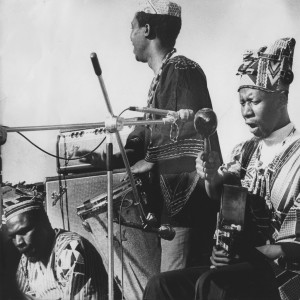
Batsumi Group Shot
“African Songbird”, Sathima Bea Benjamin’s LP, is one of the biggest holy grail that you have reissued. All the spirit of this session of homecoming is reflected in ‘Africa’, a love song and a political declaration. The same year she gave birth to Tsidi, now female rapper Jean Grae. How did you work with this singer? Do you see a sign of fate that she died just after this reissue?
We signed a contract with her and Rashid Vally who sponsored the original sessions. Matsuli launched the reissue over three days in Cape Town where I had a chance to spend time with her, talking about the past and the future. It was very sad to learn of her death just a few months after we had re-issued the LP. At the time I wrote this reflection: “Hi Rashid, is it true?”, “Yes Matt she is on the other side.” With what feels like a physical blow to the body I try to make sense of it all. Barely a month earlier I was in Cape Town for what was to be Sathima’s swan song: Observatory celebrating the reissue of her 1976 masterpiece African Songbird that I’d just reissued on my label. Although suffering from flu Sathima commanded the room with the voice of an angel. The electric atmosphere and crowded space only enhanced the palpable sense of being in the presence of greatness. As we mark Sathima’s birthday today I’m still trying to make sense of it all. Her long struggle to be heard, never playing on her African roots and resolutely uncommercial with a complete commitment to classic jazz idioms. And a big shadow cast by her partner Abdullah Ibrahim, the challenges of motherhood exacerbated by exile and an uneasy homecoming from the Chelsea Hotel in New York where she said she felt most at home. Sathima had the unique ability to strike first at your heart, not unlike the experience of hearing Billie Holiday for the first time. She cites hearing Billie’s performance in Lady Sings the Blues as being pivotal to her development as a singer. And Sathima’s original compositions like Africa and Nations in Me eschew the commonly prescribed categories of race and nationhood propagated by Apartheid. It’s a powerful combination. Her final performance at Tagore’s was highly anticipated and packed shoulder-to-shoulder. Some initial microphone issues before Sathima took to the stage, backed by the Hilton Schilder Trio, to perform one more time her classic songbook tunes, laments and the anthem Africa. “I’ve been gone much too long/and I’m glad to say that I’m home, I’m home to stay…” I was so happy for her despite the knowledge that perhaps this might all be too late. We spoke late into the evening at the Labia Cinema on Sunday and at the Mahogany Room on Tuesday about taking this forward. Too late, and now she’s on the other side. And that’s our lament: that home is still the other side.
In the liner notes of Inhlupeko Soul Jazzmen, it says: «South African jazz players felt a strong affinity with John Coltrane, who had died only a couple of years earlier.» Indeed, this record could have been also recorded on Blue Note or Prestige. How do you explain this relationship, this influence with American jazz? How South African could buy this kind of records?
South Africa was not cut off – local companies reissued jazz and Blue Note, Prestige and Riverside LPs were also imported. As the notes suggest American jazz represented an urban modern and proudly black articulation of identity. It is not at all surprising that under the social constraints of Apartheid that jazz represented the idea of an identity free of those mental and physical chains.
At the same time, other musicians were forced into exile, such as Blue Notes or Chris McGregor. Is this a scene you want to document too, as does the Ogun label?
Ogun has done an outstanding job of documenting this particular area. One artist whose recordings are sadly out of print is Johnny Dyani – it would be great to produce a box set of his material that came out on various European labels.
In the future is “Tshona” by Pat Matshikiza & Kippie Moketsie, a possible reissue? What about Dollar Brand’s “Mannenberg” or “Underground in Africa”?
Tshona and Mannenberg are very well know and have been reissued a number of times. They are not that difficult to find. Tshona was in fact Kippie’s answer to Mannenberg’s success. Underground in Africa and Shikiza Matshikiza (Pat and Kippie’s second album together) are definitely on the radar though.
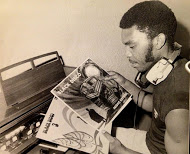
Pops Mohamed in seventies…
Black Disco
Echo On The Delay
In another vein, just as spiritual, you publish nowadays a LP with Pops Mohammed: “Black Disco”. Could you tell us more about the story of this record? The history of this band? What about their 2 other LP’s?
The sleeve notes written by Gwen Ansell, author of Soweto Blues, tells it much better than me: Just before the first Black Disco album was made, Rashid Vally’s As-Shams label (which also handled The Dynamics) had released Abdullah Ibrahim’s Mannenberg. Mohamed already knew bassist Sipho Gumede from Dorkay House. At Vally’s Kohinoor record store, he was introduced to Capetonian Coetzee, still in town after the Mannenberg recording session. “Rashid said: ‘This is Pops—he’s a new guy and he’s got compositions. Why don’t you guys talk…?’” Mohamed remembers. A vehicle was hired to bring his Yamaha from his home, and the first Black Disco album was cut: a trio with no drummer. He describes his earlier formations as “experiments”—Black Disco gave Mohamed his direction. After Night Express, he went on to become a co-founder of Movement in the City, with Cape Town drummer Monty Webber. “The name was code for let’s fight the system. It was a very dark time for us, personally and politically, and their two albums including Black Teardrops (another title the censor didn’t like) came from that emotional place.”
How could such a group like that exist , survive, play during Apartheid ?
There was a strong music scene under Apartheid. Record companies were keen to exploit the newly urbanised black population in the late 1960s and seventies. The real problem for groups was venues in which to play and record companies who would release their material. Things became a lot more difficult after the Soweto uprising in 1976 and the military-dominated government of PW Botha through the eighties
Ndikho Xaba and the Natives is part of an aesthetic commitment. More broadly, the system of segregation still very important, (present ?), between the lines, in your LPs . Can we read a political process? Point of view?
Our release programme can be read as a political statement, but I think reducing music to such interpretations reduces the transcendental power of music and assumed identity. It’s the transcendence that holds the power.
Do you think jazz is a soundtrack of emancipation?
Music has the power to transcend but emancipation from economic and cultural barriers requires a lot more work.
How do you decide on the choice of reissues?
We try to identify lost South African recordings that are in demand in second-hand circles.
What could be the label’s leitmotif?
The track ‘Africa’ by Sathima Bea Benjamin.
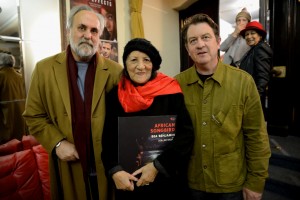
Chris Albertyn, Sathima Bea Benjamin and Matt Temple
What is the Matsuli LP you are prouder? why?
“African Songbird” – its beauty and the personal connection made with Sathima…
The memory of this scene, you revive, it is still present in the South African youth?
There is a strong renaissance of jazz and many younger players are taking the journey forward.
Are you listening to the new South African scene, jazz and soul? And is it connected with the new wave of jazz in London and UK, including children and heirs of the first generation African immigrant?
I listen to a lot of the younger South African jazz players but not that much soul. I am always on the lookout for unique music. Many of the new jazz generation have started touring to Japan, the USA and Europe. We also have British musicians like Shabaka Hutchings who has recently recording a new album in South Africa. So there is a lot of cross-fertilisation. I’m sure that the South African musicians would like more exposure but increasingly as a result of the gentrification of cities like London it is difficult to sustain a strong jazz circuit.
“Night on Earth” is a record session of kora. Could you tell us more about Derek Gripper, who has produced some of South Africa’s most extraordinary musical works, fusing the country’s disparate creative traditions with styles from around the world?
I first heard Derek Gripper’s album of kora compositions played on the guitar a few years ago and I was astounded by his playing and approach. We spoke at length about an album of him playing compositions by Philip Tabane of Malombo, or including other up and coming South African musicians re-interpreting South African standards. Who knows we may still explore this further. But we took a risk to release something different from our usual agenda in order for people to appreciate his work. And slowly he is now getting further recognition, having played recently with some of his musical heroes in Mali. It’s something very unusual and therein was the appeal.
Ndikho
Xaba Shwabada
This record is a bit out of general aesthetics of Matsuli catalogue: it is a current production in which we play themes Toumani Diabate on kora … Is it a way that you keep pursuing?
We are willing to take chances and we loved Derek Gripper’s LP so much we wanted to release it. For a long time, we have also sought to find ways we can bring some of the newer jazz onto our label. This is ongoing.
Nowadays, there are many LP labels who follow as you the model, « Less Is more », I mean more quality even if it’s more expensive… but in the same time, there are also another « new » LP market, with major companies come-back and other labels, who prefer to sell cheaper. Is it the (re)creation of two camps for the LP?
We try to keep our costs as low as possible but with very specific production standards. I’m starting to see quite a few re-issue companies taking the low cost route with certain production values being compromised. I suppose we try to strike a balance between affordability and quality. We are seeing major labels starting to lean heavily on production plants with smaller labels such as ourselves being delayed in our release schedule. Whilst there are many people who are choosing vinyl because it is in vogue I am confident that our niche audience will always stick in vinyl as opposed to paying subscriptions to technology companies for the right to listen to streams.
There are more and more reissues of old LPs, and more and more record labels (major or indie) now release their new artists on LP, or EP. Do you think that the LP reissue market could ever reach saturation point?
I think that good music will always prevail amongst our customers, so it’s really important to keep our standards high. The saturation will come with sub-standard material…
Have you received many negative answers on some of the LPs, artists, unreleased tapes, you were trying to reissue?
Not yet, although licensing and claims of ownership have stopped us from considering some specific albums.
What are your next releases?
We want to issue one of the early Harari LPs and then we are also looking at an exciting project of 78s where we hope to compile a number of albums around certain themes. Most of this material has never been released outside of its original appearance on 78 shellac.
What is the LP you dream of reissuing?
The first South African jazz LP by Sathima Bea Benjamin – this was cut to acetate but is now long lost.
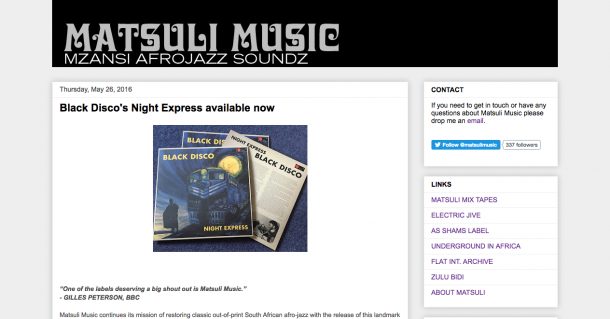
Loved listening to all of this music. I knew Sathima when she lived in NYC. Also, I produced a Philip Tabane album in the ’80’s called “Unh!”
Je considère “Batsumi” est un véritable must-have. Rien que pour cette réédition, Matt et Chris ont fait un travail fantastique. “Inhlupelo” est une autre merveille des Sould Jazzmen avec Tete Mbambisa.
Matt et Chris, continuez votre travail de redécouverte: en particulier, la prochaine réédition du groupe Harare connaitra, j’en suis sûr, un succès comparable aux précédents.
Merci pour eux !